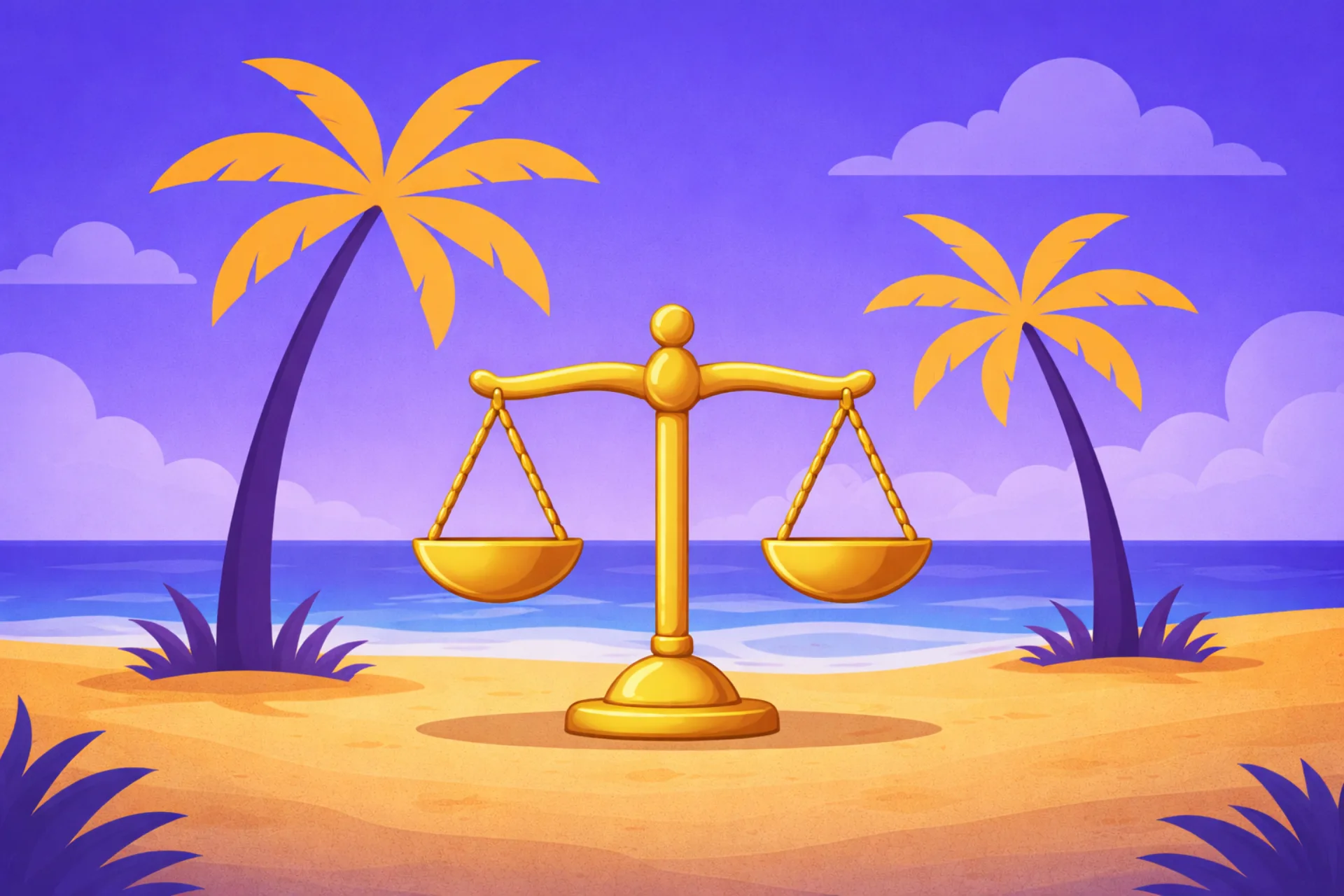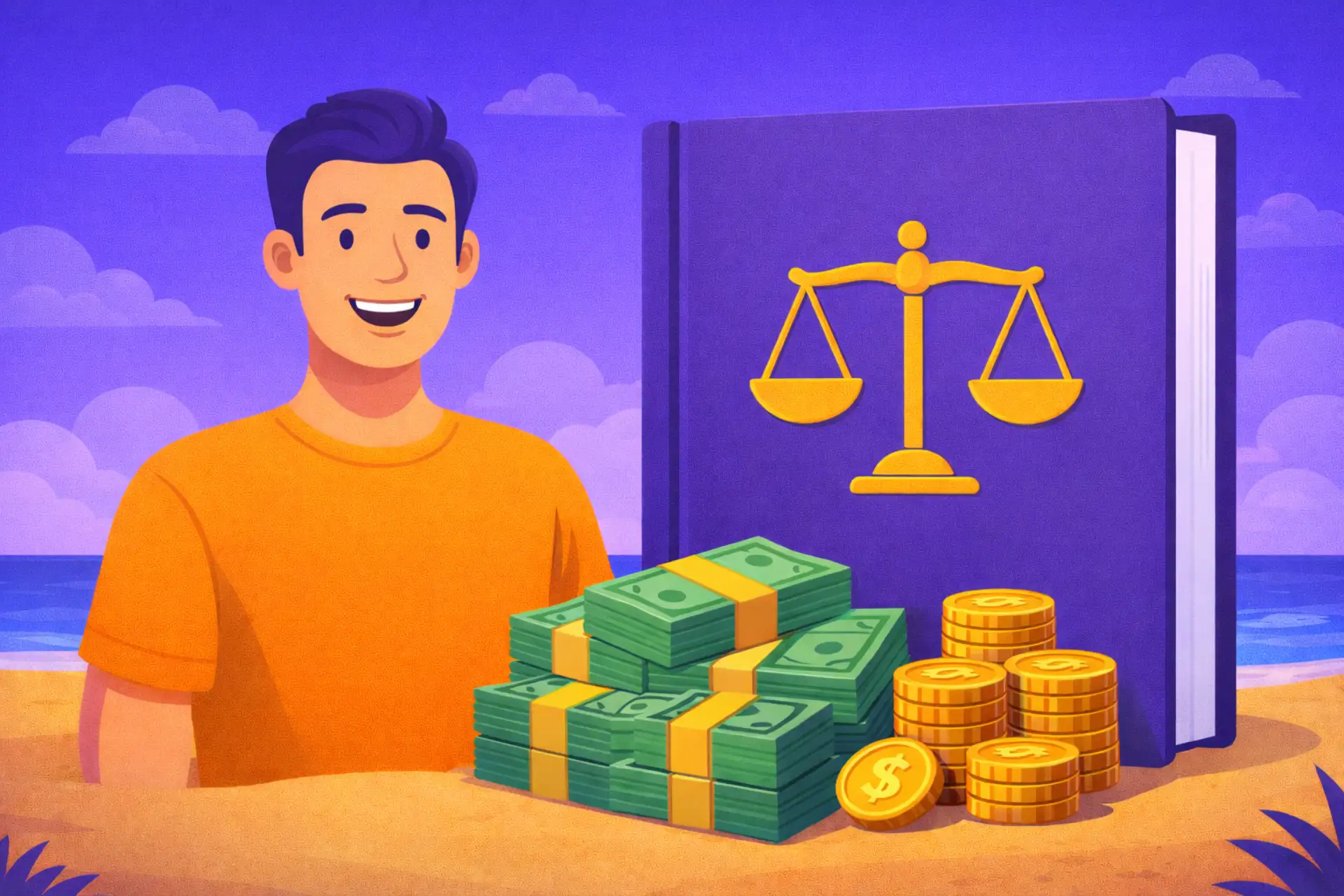This state makes it tough — most gambling laws here are straight-up no-go. But we dug into how Hawaii sweepstakes casinos fit in anyway.

By Jerard V.
Sweepcasinos Choice
25,000 GC + 2.5 SC
By Jerard V.
Welcome bonus
200,000 GC + 20 Spins
By Nemanja M.
Welcome bonus
550K GC + 55 SC
By Jerard V.
Welcome bonus
7,500 GC + 2.5 SC

Hawaii criminalizes all forms of gambling. There are no licensed casinos, no sports betting, and not even a state lottery.
And that rule is written into HRS §712-1220 and §712-1223, and it applies statewide — including online.
So the only reason sweepstakes casinos can legally run here is because they avoid the legal definition of gambling completely.
Under HRS §712-1220, gambling in Hawaii only happens if all three of these apply:
That third part — the payment — is what the law calls “consideration.” If a site removes that piece, the law doesn’t apply.
This is exactly what real sweepstakes casinos do:
→ They don’t make you pay to play for prizes
→ They provide a free-entry path — usually by mailing in a request
→ They base all prize wins on those sweepstakes entries, not cash bets
No payment = no gambling.
And because Hawaii law only kicks in when you risk something of value, that makes the entire sweepstakes structure legal to use here.
If you’re in Hawaii, the law doesn’t leave much wiggle room — especially when it comes to anything that even resembles gambling.
Below, we’ve broken down the key laws that matter if you’re thinking about playing on a sweepstakes casino from the islands.
| Law / Statute | What It Says | What It Means for You |
| HRS §712-1220 | Defines gambling as risking something of value on chance to win a prize | If you pay to play for a chance to win, you’re gambling under Hawaii law |
| HRS §712-1223 | Criminalizes the act of gambling (petty misdemeanor) | Just playing on a real-money casino site can put you in violation |
| HRS §712-1221 | Promoting gambling in the first degree (felony) | Operators or affiliates profiting from illegal games can face serious charges |
| HRS §712-1222 | Promoting gambling in the second degree (misdemeanor) | Even smaller-scale promotion (e.g. hosting, advertising) can carry criminal penalties |
| HRS §712-1224 | Possessing gambling records or devices is illegal | Sites using slot-style games without legal structure risk being flagged as illegal |
No — Hawaii doesn’t have a separate statute for sweepstakes.
Instead, sweepstakes casinos operate legally in Hawaii because they avoid violating the gambling definition in HRS §712-1220. As long as a platform doesn’t require payment to enter and offers a working free-entry path, it avoids meeting all three criteria (prize + chance + consideration) that trigger the gambling ban.
This means:
There’s no licensing body in Hawaii for sweepstakes
The legality is based on what sweepstakes don’t do — not what they’re licensed to do
If the structure slips into real-money territory, it immediately becomes illegal under Hawaii’s existing gambling laws
▶ If you’re playing from Hawaii, always assume legality depends on structure — not branding. If you’re being asked to pay for a chance to win, that site doesn’t survive under Hawaii law.
There’s no gambling license system in Hawaii, so sweepstakes casinos don’t need permission from a regulator.
But that doesn’t mean everything’s wide open to us.
The platforms set the rules themselves — and if you don’t meet them, they will surely cut you out when it’s time to cash in.
Here’s what decides if you’re in or out.
Hawaii law doesn’t pin down an age for sweepstakes play. Since these sites aren’t legally “gambling” under HRS §712-1220, the state stays out of it. But the platforms don’t.
→ Most set the line at 18+
→ Some hold firm at 21+, especially where cash prizes are on the table
They won’t catch you early — they’ll wait until you try to withdraw. That’s where age enforcement actually kicks in.
You’re 20. You sign up on a sweepstakes site with a 21+ rule. No red flag. A few weeks later, you redeem a $75 win. They ask for ID. It doesn’t clear the bar. No payout, no retry — just a closed ticket.
What this means for you
Never fudge around with your birthdate. If your age doesn’t match their terms the moment you win something, the system treats the whole win as if it never happened. And there’s no state agency to argue your case.
Where your account says you live doesn’t matter. What matters is where your phone or laptop says you are right now — and the sites are watching closely.
→ Most use a mix of IP checks and device location
→ VPNs, hotels, or mobile hotspots can all trip the system
→ If your location shows you outside Hawaii, even for a minute, the prize request stalls
You’re playing from Hilo and hit a win. A day later, you’re visiting friends in Washington and try to redeem. The site checks your IP, sees you’re not in Hawaii, and blocks the withdrawal.
Doesn’t matter that both states allow sweepstakes or the best social casinos — if they can’t tie the request to your approved state, they won’t pay.
What this means for you
Skip the VPN. Stay off hotel Wi-Fi. If the site sees you somewhere it doesn’t support, your account gets flagged. You might not even know until your payout disappears.
The signup process feels casual — email, password, maybe a nickname. But when it’s time to redeem, that light touch ends fast.
You’ll need to submit:
A valid government ID
A bill or statement with your name and Hawaii address
Identical details to what you used during signup
Miss by one letter and the system sees it as a mismatch.
You registered as “Malia K.” But your ID says “Malia Kahakuloa.” No address conflict. No fraud. Just a name that isn’t exact. The redemption stops cold, and the site doesn’t reopen it.
What this means for you
Use your real name from the start. If your ID and account don’t line up exactly — full name, date of birth, address — the system blocks your win automatically. And because Hawaii doesn’t license or regulate these platforms, there’s nowhere to appeal.
Just because a site lets you through the front door doesn’t mean it plans to keep you. Some sweepstakes casinos name Hawaii in their terms — clean and direct. Others leave the state out entirely, hoping nobody asks. That silence? It’s not harmless.
→ If Hawaii is spelled out, you’re fine
→ If it’s not, you’re playing without a net
→ They can shut things down at any point — no warning, no payout
You join a sweepstakes site on a Wednesday. Everything works — sign-up goes through, coins arrive, games spin. By Sunday, you’re sitting on a $200 win. You go to redeem, and the system kicks back an error.
Support tells you Hawaii isn’t on their approved list. Doesn’t matter that they let you register. They never said you could stay.
The win vanishes. So does your access.
What this means for you
Scan the terms like you would a lease. If Hawaii isn’t listed — not even once — don’t touch it. Don’t assume quiet equals consent. Sites change policies. Some just go silent. Either way, your account is the first thing to get cut.
Big-name sweeps sites you can’t use in Hawaii
If you end up on a site that’s not running a real sweepstakes model, you’re not just rolling the dice — you’re opening yourself up to a whole different set of problems.
Here’s how things could play out if a platform skipped the rigid legal structure and the five possible consequences you could face as a sweepstakes casino player in Hawaii.
Hawaii makes it a clear crime to gamble, even online. HRS §712-1223 says placing a bet in an illegal game is a petty misdemeanor.
If you’re risking money on a game of chance and there’s no working free-entry method? That’s gambling under §712-1220. And it’s very much so banned here.
Example: You spend $20 on coin bundles and use them to spin some fancy sweepstakes slots that pay real cash. There’s no mail-in option or free-entry method. That’s gambling by Hawaii’s standards — straight up.
You can win. You can click withdraw. You might even get the “congrats” message. But until that cash lands in your account, it’s just numbers sitting on their side of the glass. And they control the switch.
Example: You line up a $150 prize and hit redeem. The system takes it. A day later, your login gets blocked — Hawaii users “temporarily restricted.” Your balance is frozen in digital amber. Nothing moves, and no one answers are to be found.
These sites aren’t accountable to Hawaii. They’re not on any U.S. radar. When an error hits or your account gets flagged, it’s lights off. The help system’s just for show.
Example: You’re halfway through a really good session when everything freezes. When it reloads, your account balance is zeroed. You file a support ticket. It’s marked “reviewed” in under an hour. Then nothing. No response, no fix, no next step.
They ask for verification like it’s standard. You upload your license. A bill. Maybe even a face scan. After that? You’re not in control anymore. You’re sending real data to a borderless company with no rules and no ceiling on what they do with it.
Example: You upload documents to cash out. Weeks later, loan offers start hitting your inbox — with your full name and address already filled in. You trace it back. That site’s support inbox bounces your message.
Operators know the drill, believe us. Hawaii classifies illegal gambling promotion as a felony (HRS §712-1221, §712-1222). So when any kind of risk creeps in — maybe a flagged transaction, maybe a legal notice — they shut down access fast. Quietly. Without blinking.
Example: You log in like usual. This time, the homepage says, “This service is no longer available in your region.” No warning. No download option. Your coins, history, and balance all folded into silence.
The following isn’t our suggestion — you should look at it like a manual. If you’re in Hawaii and thinking about trying a sweepstakes casino, this is the checklist you use first.
This is how you tell the difference — before your time, your payout, or your ID ends up somewhere it shouldn’t.
This is the one that matters most. Hawaii calls it gambling if you pay for a shot at winning something. Doesn’t matter if the games look fun or call themselves “promotional.” If you’ve gotta spend first, it’s over.
▶ What to check: Can you sign up, get sweep coins, and start playing for prizes without buying anything? If you’re forced to spend up front, the site’s already outside the law.
Lots of sites toss “no purchase necessary” into the footer like it means something. But when you try to use it? Good luck finding the form. Or getting a response. Or getting anything back in the mail.
▶ What to test: Email support. Ask where to send your postcard. See how long they take to respond. If it feels like they don’t actually want you to use the free option — believe them.
You’ll usually see two types of coins: gold and sweep. The gold ones are for show. The sweep ones are the ones you redeem. If the sweep coins are only available when you pay? That’s not a bonus — that’s the product. And buying prize entries is exactly what Hawaii bans.
▶ What to look for: Can you get sweep coins without buying gold ones? If the answer’s no, the setup doesn’t hold up here.
Not “most U.S. states.” Not “some restrictions apply.” You want Hawaii written out, clearly. If it’s not listed, you’re not protected — and they can cut you off whenever they feel like it.
▶ What to scan: Terms. FAQ. Help section. If “Hawaii” doesn’t show up anywhere, don’t assume it’s fine just because the site loads.
Some of these sites try super hard to look like a legit sweepstakes site. But scroll past the shiny buttons and it’s just cash and not sweeps games hiding behind marketing copy. If there’s no breakdown of how the sweepstakes system works — entries, eligibility, prize rules — you’re looking at a shortcut. And shortcuts do not survive in Hawaii.
▶ What to notice: Are the rules clear? Do they walk you through the process? Or are you left guessing while you hand over money?
Reach out. Ask about Hawaii. Ask how to enter without buying anything. If you get a vague, robotic answer — or just a link to a page you’ve already read — you already know how that payout’s going to go.
▶ What to try: Hit them with something specific. “Does your mail-in method work for Hawaii residents?” If they stall or deflect, they’re not ready for this market — and you shouldn’t be on their site.

Hawaii bans gambling, but that doesn’t mean your sweepstakes prizes fly under the radar. Even if the site is legal, the money you win is still considered taxable income — at least at the federal level. And if the site’s legit, they’ll report it.
Here’s how it plays out.
Doesn’t matter how you got the prize. If it has dollar value, the IRS treats it like income. Whether it came from a mail-in entry, a sign-up bonus, or a pile of sweep coins you never paid for — it still counts.
▶ Example: You win $420 worth of sweep prizes and cash it out. The site doesn’t send a form because it’s under the $600 threshold, but the money went into your bank account — and that means you’re expected to report it yourself.
The moment your total winnings on a platform cross $600 in a calendar year, they’re going to ask for your Social Security number. Why? Because they’re about to send the IRS a 1099-MISC with your name on it. You’ll get a copy too.
▶ What this means: If you win big and want to redeem, get ready to fill out a W9. If you skip it, your payout stalls. If you send it, that win becomes official income.
– IRS Publication 525 (Taxable Income Rules)
– IRS 1099-MISC Instructions (2026)
Right now, sweepstakes and social casinos are still legal in Hawaii — not because the state allows them, but because they dodge the definition of gambling in HRS §712-1220. They don’t ask you to pay for a shot at a prize. And that’s what keeps them on this side of the law.
But here’s the somewhat pretty big catch: Hawaii’s never been gambling-friendly. It bans casinos, online betting, poker rooms, even bingo halls.
So while there’s no current bill targeting sweepstakes casinos, it wouldn’t take much to change that. One push from the Attorney General, or one legislative session with enough headlines, and that legal gap could close fast.
No bill = not forever. Just for now.
Compare Hawaii’s sweepstakes rules and top sites with those of its closest U.S. state.